I published the following op-ed piece in Inside Higher Education this morning. I’ve drawn on my new book, Beyond the University: Why Liberal Education Matters, which will be published by Yale University Press in the spring.
Over the last year there has been a steady stream of articles about the “crisis in the humanities,” fostering a sense that students are stampeding from liberal education toward more vocationally oriented studies. In fact, the decline in humanities enrollments, as some have pointed out, is wildly overstated, and much of that decline occurred in the 1970s and 1980s. Still, the press is filled with tales about parents riding herd on their offspring lest they be attracted to literature or history rather than to courses that teach them to develop new apps for the next, smarter phone.
America has long been ambivalent about learning for its own sake, at times investing heavily in free inquiry and lifelong learning, and at other times worrying that we need more specialized training to be economically competitive. A century ago these worries were intense, and then, as now, pundits talked about a flight from the humanities toward the hard sciences.
Liberal education was a core American value in the first half of the 20th century, but a value under enormous pressure from demographic expansion and the development of more consistent public schooling. The increase in the population considering postsecondary education was dramatic. In 1910 only 9 percent of students received a high school diploma; by 1940 it was 50 percent. For the great majority of those who went on to college, that education would be primarily vocational, whether in agriculture, business, or the mechanical arts. But even vocationally oriented programs usually included a liberal curriculum — a curriculum that would provide an educational base on which one could continue to learn — rather than just skills for the next job. Still, there were some then (as now) who worried that the lower classes were getting “too much education.”
Within the academy, between the World Wars, the sciences assumed greater and greater importance. Discoveries in physics, chemistry, and biology did not seem to depend on the moral, political, or cultural education of the researchers – specialization seemed to trump broad humanistic learning. These discoveries had a powerful impact on industry, the military, and health care; they created jobs! Specialized scientific research at universities produced tangible results, and its methodologies – especially rigorous experimentation – could be exported to transform private industry and the public sphere. Science was seen to be racing into the future, and some questioned whether the traditional ideas of liberal learning were merely archaic vestiges of a mode of education that should be left behind.
In reaction to this ascendancy of the sciences, many literature departments reimagined themselves as realms of value and heightened subjectivity, as opposed to so-called value-free, objective work. These “new humanists” of the 1920s portrayed the study of literature as an antidote to the spiritual vacuum left by hyperspecialization. They saw the study of literature as leading to a greater appreciation of cultural significance and a personal search for meaning, and these notions quickly spilled over into other areas of humanistic study. Historians and philosophers emphasized the synthetic dimensions of their endeavors, pointing out how they were able to bring ideas and facts together to help students create meaning. And arts instruction was reimagined as part of the development of a student’s ability to explore great works that expressed the highest values of a civilization. Artists were brought to campuses to inspire students rather than to teach them the nuances of their craft. During this interwar period a liberal education surely included the sciences, but many educators insisted that it not be reduced to them. The critical development of values and meaning was a core function of education.
Thus, despite the pressures of social change and of the compelling results of specialized scientific research, there remained strong support for the notion that liberal education and learning for its own sake were essential for an educated citizenry. And rather than restrict a nonvocational education to established elites, many saw this broad teaching as a vehicle for ensuring commonality in a country of immigrants. Free inquiry would model basic democratic values, and young people would be socialized to American civil society by learning to think for themselves.
By the 1930s, an era in which ideological indoctrination and fanaticism were recognized as antithetical to American civil society, liberal education was acclaimed as key to the development of free citizens. Totalitarian regimes embraced technological development, but they could not tolerate the free discussion that led to a critical appraisal of civic values. Here is the president of Harvard, James Bryant Conant, speaking to undergraduates just two years after Hitler had come to power in Germany:
To my mind, one of the most important aspects of a college education is that it provides a vigorous stimulus to independent thinking…. The desire to know more about the different sides of a question, a craving to understand something of the opinions of other peoples and other times mark the educated man. Education should not put the mind in a straitjacket of conventional formulas but should provide it with the nourishment on which it may unceasingly expand and grow. Think for yourselves! Absorb knowledge wherever possible and listen to the opinions of those more experienced than yourself, but don’t let any one do your thinking for you.
This was the 1930s version of liberal learning, and in it you can hear echoes of Thomas Jefferson’s idea of autonomy and Ralph Waldo Emerson’s thoughts on self-reliance.
In the interwar period the emphasis on science did not, in fact, lead to a rejection of broad humanistic education. Science was a facet of this education. Today, we must not let our embrace of STEM fields undermine our well-founded faith in the capacity of the humanities to help us resist “the straitjackets of conventional formulas.” Our independence, our freedom, has depended on not letting anyone else do our thinking for us. And that has demanded learning for its own sake; it has demanded a liberal education. It still does.



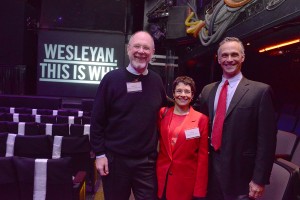
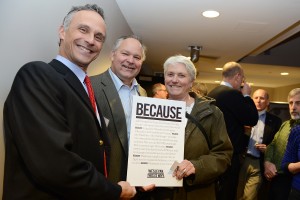
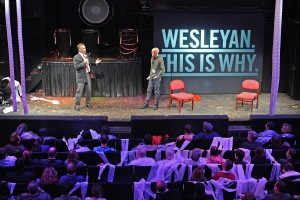
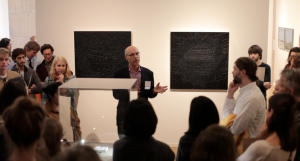
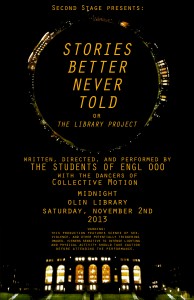
![photo[12]](https://roth.blogs.wesleyan.edu/files/2013/11/photo12-e1383592954251-300x225.jpg)
![photo[13]](https://roth.blogs.wesleyan.edu/files/2013/11/photo13-300x225.jpg)